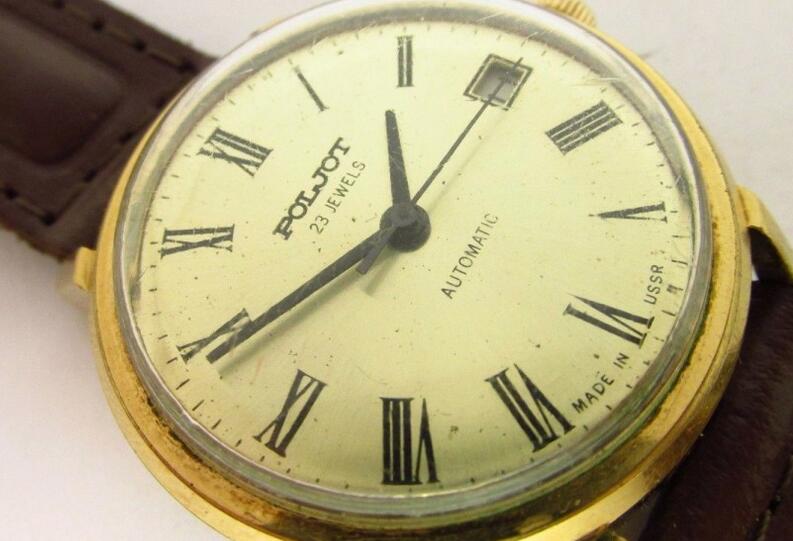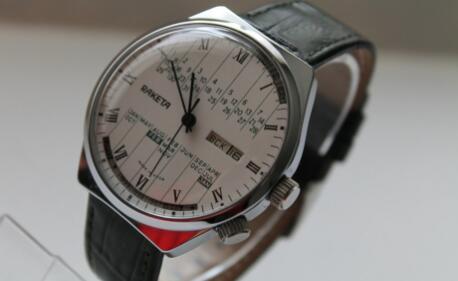Cheap Copy Watches Back In The USSR
Its history is long, its copy watches unquestionably exceptional. But we’re not talking about Switzerland or even America. Soviet Union era timepieces – a fascinating realm of lesser-known watches from largely defunct factories that once thrived in the former USSR – are only now starting to be recognized for their vintage worth.
Poljot, Raketa, Vostok. The names might not rival Omega or even IWC just yet, but hard-core collectors admit they have incredible potential. It’s a growing obsession, based largely on near-identical attributes to their illustrious Swiss comrades: retro-aesthetic beauty, superior precision, and soon-to-be top-dollar value.
“Soviet watches are defined by their quality,” says collector Dashiell Oatman-Standford. “While Swiss and American manufacturers had different tiers of production, from very low-quality to the crème de la crème, the Soviets focused only on high-quality, fully jeweled lever movements. In this way, the Soviets could focus all of their attention on the best materials and most robust designs possible.”

The history of Russian watches dates back to the 1700s. But its heyday was under Joseph Stalin. Rumor has it that during the late stages of World War II, frontline Russian soldiers coming into contact with fellow American and British allies noticed how casually they treated their gold-plated, multi-jeweled watches, and this immediately caused resentment.
Wanting to nip capitalistic intent in the bud, Stalin amped up USSR watch production, from two factories to dozens spread all across the country, with a fanatical focus on imitating the Swiss. It was a massive success, and by the 1960s, demand was such that Soviet watch production was second only to the Swiss.
“We’re talking hundreds of thousands of watches produced monthly during its peak,” says Oatman-Stanford. “As tensions softened and international exchange became more possible, the export market became huge for the Soviets. They were sold all throughout Europe, with particular prominence in the United Kingdom, as well as all over the Americas and Asia.”
These were watches of incredible quality and craftsmanship, on a par with the Swiss and oftentimes outright copies, but at a much more affordable price. Hair-spring designs, shock protection, fully jeweled lever designs, beautiful polished movements – attributes only ever seen in the high-level timepieces, but standard for the Soviets. In short, the USSR built watches on similar foundations to its politics: functional, rugged and egalitarian.
By the late 1970s, with the USSR on its last legs, underfunding and disorganization led to the industry’s demise. At the fall of the Berlin Wall in 1989, a combination of economic instability, influx of Western goods, lack of resources and an overall confusion of where the Soviet Union was headed, led to the collapse of one of the great replica watch empires.
The Russian watch industry never fully recovered, despite a number of modern attempts to revive it. But the years have been surprisingly kind to these timepiece relics, and a recent revival of interest in all things Soviet has led to a growing market. A market whose history remains vague and is still being written, and in which new discoveries are being made through the sheer act of collecting.

“In my eight years of observing the market, I would estimate that the prices have at least tripled. On some rare models, even more,” says collector Philippe Thommen. “But the prices are still quite low compared to other watches. You still can get more ‘watch’ for your money, no matter if you buy a vintage piece or a new one.”
Indeed, prices for Soviet watches are much more affordable than their vintage Swiss and American counterparts, starting as low as US$20 for a high-quality piece dating back 50 years or more. Die-hard collectors point to a small number of key brands to get you started.
But beyond the vintage-watch protocols of doing your research and bidding smart, there is the question of where to buy them.
The internet is still king, including eBay, Etsy and Polish auction site Allegro, but a number of authorized dealers have cashed-in on the trend, including Red Army Watches, a seller with retail stores in Singapore, Malaysia and Indonesia. Visiting Russia and former Iron Curtain countries can also yields positive results, not only in terms of bargains, but hard-earned lessons from those on the ground.
But more important than where, is why. All collectors admit that a fundamental purpose of building an interest in Soviet fake watches is to understand that these are key pieces of recent history.
“They tell the stories of an industry in its infancy; of war and triumph and loss; of burgeoning technology; of the mother who bestowed upon her son a token of her love,” says Oatman-Stanford. “These glimpses into a bygone era bring inanimate objects to life.”